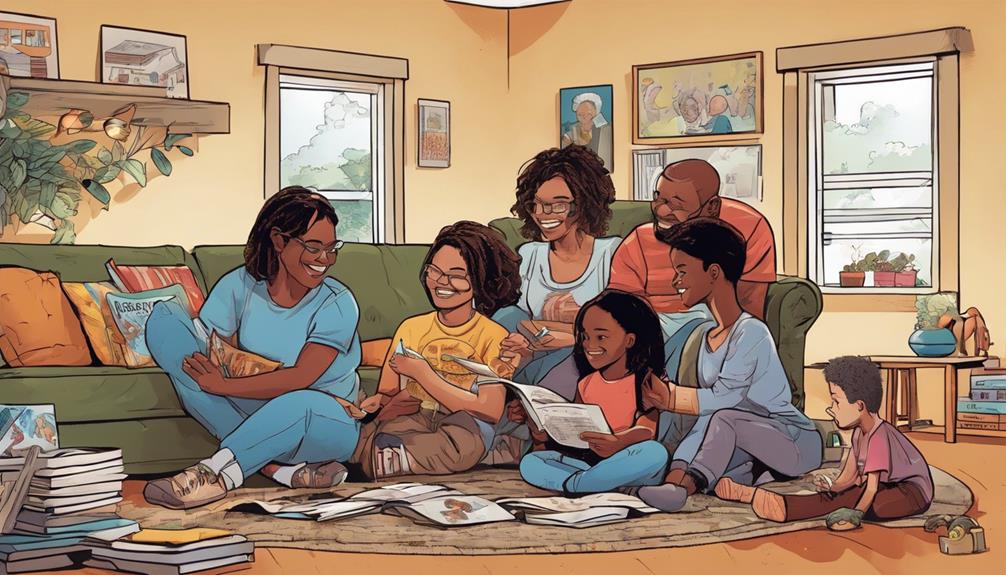{“statusCode”:401,”message”:”License key missing”}
Key Takeaways
- Acknowledge historical events shaping parents' values.
- Practice active listening to bridge communication gaps.
- Understand differing communication styles and preferences.
- Cultivate empathy to foster understanding across generations.
- Establish boundaries while appreciating diverse perspectives.
Characteristics of Parennials
Understanding the characteristics of Parennials is essential for effective communication and relationship-building with parents from this generation. Parennials exhibit a strong sense of parenting autonomy, preferring to make decisions independently. They often rely on the internet for parenting advice, turning to sources like Google and YouTube instead of traditional avenues.
This shift towards internet reliance highlights their openness to new methods and their assertiveness in setting boundaries. However, these changes can sometimes lead to conflicts and challenges within family dynamics. It's important to navigate these differences with empathy and understanding, bridging the generational gap for smoother interactions.
Challenges in Inter Generational Communication

Addressing intergenerational communication challenges requires acknowledging and addressing differences in values, experiences, and communication styles between parents and children. The Generation Gap, often amplified by technological advancements and shifting societal norms, can lead to misunderstandings and obstacles in communication.
Parents and children may have varying perspectives on parenting approaches, technology usage, and societal issues, creating barriers to effective dialogue. Historical events and cultural shifts further shape how parents and children interact and understand each other.
To bridge the generation gap, it's essential to approach communication with empathy, engage in active listening, and be willing to have open and honest conversations. By recognizing and respecting the differences in values and experiences between generations, both parents and children can work towards building stronger, more meaningful relationships.
It's through understanding and embracing these challenges that families can foster deeper connections and create a more harmonious intergenerational dynamic.
Advice for Grandparents

Hey there, grandparents!
As you navigate the role of grandparenting in modern times, remember the importance of bridging technology gaps with curiosity and a willingness to learn.
Sharing family heritage can create meaningful connections and provide a sense of identity and belonging for your grandchildren.
Embracing these aspects can enrich your relationship and create lasting bonds across generations.
Grandparenting in Modern Times
In today's rapidly changing parenting landscape, modern grandparents can enhance their role by staying informed and open-minded about the challenges and opportunities of grandparenting in the digital age. As senior citizens, you hold a wealth of wisdom and experience that can greatly enrich the lives of the younger generation.
Although online resources have become prevalent in seeking parenting advice, your unique insights and personal touch remain invaluable. By staying curious about your children's times and letting go of judgment, you can create a nurturing environment where communication thrives.
Asking for advice from your children not only reduces tensions but also fosters deeper understanding and connection. Embracing open-mindedness and showing overwhelming appreciation for your children can strengthen family bonds and bridge generational gaps.
Bridging Technology Gaps
To effectively bridge technology gaps with your grandchildren, consider embracing digital tools and platforms that they use for parenting guidance. In today's fast-paced world, technology impacts how parenting advice is sought and shared, creating generational differences in parenting approaches.
Here are some tips to help you explore this new landscape:
- Stay Curious: Explore parenting websites, apps, and social media platforms to understand the resources available to parents today.
- Ask for Guidance: Don't hesitate to ask your grandchildren for help understanding technology or grasping how they use it for parenting advice.
- Attend Workshops: Attend technology workshops or classes tailored for older adults to enhance your digital skills.
- Share Wisdom: While technology is valuable, your life experience and parenting wisdom are also invaluable. Find a balance between traditional advice and modern tools.
- Bond Over Tech: Use technology as a way to bond with your grandchildren. Play online games together or share interesting articles related to parenting.
Sharing Family Heritage
By embracing and sharing your family heritage, grandparents can pass down valuable wisdom and traditions to future generations. Your family heritage holds a wealth of stories, customs, and beliefs that can strengthen the bond between you, your children, and your grandchildren.
Generational differences may sometimes make it challenging to communicate effectively, but by opening up about your family heritage, you can create opportunities for understanding and connection. Embrace curiosity about your children's experiences and be willing to let go of any preconceived expectations to foster open communication within your family.
Seek support and self-awareness through counseling to navigate these generational differences with grace and enhance your relationships. Stay open-minded and ask thoughtful, open-ended questions to gain insights from your children and grandchildren, deepening your understanding and appreciation of each other.
Tips for Young Parents

As a young parent, finding balance between work and family life can be challenging, but remember to stay true to your priorities and set aside quality time for your loved ones.
Setting boundaries with technology is essential to guarantee meaningful connections with your children and promote healthy family dynamics.
Embrace these tips with an open heart, knowing that every effort you make in nurturing your family is valuable and significant.
Balancing Work and Family
When balancing work and family as a young parent, setting clear boundaries and prioritizing self-care are essential strategies to prevent burnout and manage stress effectively. It's important to remember that juggling these responsibilities can be challenging, but with the right approach, you can find a harmonious balance.
Here are some tips to help you navigate this demanding but rewarding journey:
- Create a flexible schedule: Adjust your work hours to accommodate family needs.
- Leverage technology: Utilize apps and tools for efficient time management.
- Build a support network: Seek help from family, friends, or support groups.
- Communicate openly: Talk to your employer about your family commitments.
- Practice mindfulness: Take time for yourself to recharge and stay present with your loved ones.
Setting Boundaries With Technology
To navigate the challenges of parenting in the digital age, young parents must establish clear boundaries with technology to maintain a healthy balance in their family life. Even though children live in a world where technology is ever-present, it's important to set limits to guarantee they develop essential life skills and maintain real connections with family and friends.
While it's tempting to rely on apps, Google, and YouTube for parenting advice, remember that traditional sources like grandparents offer valuable wisdom that shouldn't be overlooked. By setting boundaries with technology, you can create space for meaningful interactions, creativity, and quality time with your children.
Keep in mind that utilizing online resources should complement, not replace, hands-on parenting and face-to-face communication. Striking a balance between technology use and setting boundaries won't only benefit your family dynamics but also help you feel more confident and in control as a young parent in the digital era.
Impact of Technology on Parenting

As a parent maneuvering through these changes, here are some key ways technology is influencing modern parenting:
- Parennials, parents who are heavily reliant on technology, often turn to apps, Google, and YouTube for parenting advice, seeking quick solutions tailored to their child's needs.
- Grandparents, once primary sources of parenting wisdom, are now taking a back seat as technology provides instant access to a wealth of information, altering the traditional advice-giving dynamic.
- The accessibility of information through technology not only influences but also shapes parenting decisions, empowering parents to make informed choices.
- Technology enhances parenting autonomy and confidence among Parennials, offering support and guidance at their fingertips.
- The internet has revolutionized the way parents seek guidance, changing how they interact with parenting resources and fostering a community of shared experiences and knowledge.
Nurturing Family Relationships

Parenting in the digital age presents unique challenges, but fostering strong family relationships remains paramount for a thriving household. Building and nurturing family relationships require a deep understanding of the differences between generations. By actively listening, showing empathy, and engaging in open dialogue, you can bridge the generation gap and strengthen the bonds within your family.
Appreciating diverse perspectives, setting boundaries, and aiming for mutual understanding are key elements in nurturing family relationships. Each generation brings valuable experiences and wisdom to the table, which, when acknowledged, can lead to harmonious interactions and a sense of unity among family members.
Creating a supportive and inclusive environment through effective communication not only strengthens the familial bonds but also promotes a deeper connection and a shared sense of belonging. Remember, fostering strong family relationships takes effort and understanding, but the rewards of a close-knit and supportive family unit are immeasurable.
Strategies for Understanding Different Perspectives

When seeking to understand different perspectives from parents of varying eras, it's imperative to appreciate the significance of historical context in shaping their beliefs and values.
Show empathy towards their experiences, recognizing the impact of past events on their worldview.
Utilize active listening techniques to truly connect with their unique viewpoints and foster meaningful conversations that bridge generational gaps.
Historical Context Importance
Understanding the significance of historical context is essential for gaining insight into the diverse perspectives of parents from different eras. By delving into the historical events, societal norms, and cultural influences that have shaped the values and behaviors of parents over time, you can begin to appreciate the unique lens through which each generation views the world.
To help you navigate this journey of understanding, consider the following points:
- Historical events have a profound impact on shaping parental perspectives.
- Societal norms play an essential role in influencing parenting styles and beliefs.
- Cultural influences contribute to the values and behaviors passed down through generations.
- Exploring historical context can provide valuable insights into the challenges and experiences faced by parents from diverse eras.
- Understanding the historical backdrop allows you to empathize with the parenting styles and values of parents from different generations.
Empathy Towards Experiences
To foster empathy towards experiences and understand different perspectives, actively engaging in open-minded listening is essential. By truly listening to your parents from different eras, you can gain a deeper understanding of the challenges they faced and the values they hold dear.
Acknowledging the historical influences that shaped their perspectives allows you to appreciate the unique experiences that have shaped their lives.
Empathy towards experiences requires recognizing the impact of cultural norms and societal changes on their beliefs and behaviors. By taking the time to understand the generational challenges they encountered, you can bridge communication gaps and strengthen your relationship with them.
Active Listening Techniques
Engage in active listening techniques to better understand different perspectives and enhance communication with parents from different eras. Active listening involves more than just hearing; it requires your full attention, understanding, and appropriate responses to truly connect with the speaker.
Here are some strategies to help you become a better active listener:
- Focus on the Speaker: Dedicate your attention solely to the speaker without any distractions to show genuine interest in their perspective.
- Practice Reflective Listening: Repeat or paraphrase what the speaker said to make sure you grasp their message accurately, fostering a deeper connection.
- Utilize Nonverbal Cues: Use eye contact, nodding, and mirroring the speaker's emotions to convey empathy and understanding nonverbally.
- Build Trust and Strengthen Relationships: Active listening helps in building trust, strengthening relationships, and resolving conflicts effectively.
- Enhance Communication Skills: By actively listening, you can bridge the generation gap and communicate more effectively with parents from different eras.
Importance of Empathy in Communication

An essential aspect of effective communication with parents from different eras is recognizing the significance of empathy. Empathy goes beyond just hearing words; it involves truly understanding and sharing the emotions and experiences of your parents. By stepping into their shoes, you can grasp their viewpoints and connect on a deeper level. This emotional connection is the foundation of trust and strong relationships that can overcome any generational gaps that may exist between you.
| Importance of Empathy in Communication |
|---|
| Builds trust |
| Fosters better relationships |
| Bridges generational gaps |
| Acknowledges emotions |
| Overcomes misunderstandings |
Building Strong Connections

Understanding generational differences can greatly enhance your ability to build strong connections with parents from different eras. Effective communication strategies are key in bridging the gap with parents. Acknowledging and respecting their unique perspectives and experiences can deepen your relationships.
By sharing common interests and engaging in open discussions, you can foster understanding and closeness across generations. Cultivating empathy and patience is essential for creating meaningful and fulfilling connections with parents from different eras.
Remember, building strong connections takes effort and understanding from both sides. It's about listening with an open heart, being willing to learn from each other, and cherishing the bond that transcends age differences.
Embrace the opportunity to connect on a deeper level, knowing that the richness of these relationships lies in the willingness to bridge the gap with love and empathy.
Sensitivity in Inter Generational Relationships

To navigate intergenerational relationships effectively, it's essential to demonstrate sensitivity towards the diverse perspectives and experiences of parents from different eras. Understanding and respecting the impact of historical events, cultural norms, and technological advancements on parental behavior and communication styles is vital.
By actively listening, showing empathy, and being open to learning from the wisdom of parents across generations, you can nurture harmonious relationships. It's important to recognize potential differences in values, beliefs, and communication preferences to build positive connections.
Sensitivity fosters mutual understanding, appreciation, and effective communication, bridging the gap between parents and children from different eras. Embracing sensitivity in intergenerational relationships not only brings you closer to your parents but also enriches your own perspective and deepens your bond with them.
Frequently Asked Questions
How to Deal With the Generation Gap Between You and Your Parents?
Dealing with the generation gap between you and your parents involves understanding their unique communication styles and values. Open, respectful dialogue is key to bridging this gap and fostering mutual understanding.
Acknowledge the influence of historical events, cultural norms, and technological advancements on your generational differences. Finding common ground and shared experiences can help strengthen your relationship.
Approach conflicts with empathy, patience, and active listening to build a deeper bond across generations.
How Do You Close the Gap Between Generations?
To close the gap between generations, start by listening actively to your parents' stories and experiences. Show empathy towards their perspectives shaped by different eras.
Understanding their values in the context of historical events can build bridges between your worlds. Engage in open dialogues with respect and appreciation for their journey.
Embrace the richness of diverse viewpoints within your family, fostering harmony through connection and mutual understanding.
How Do You Communicate With Generation Gap?
To communicate effectively across the generation gap, it's essential to approach conversations with patience, empathy, and an open mind.
Active listening, where you truly hear and understand their perspective, is key. Show respect for their experiences and values, even if they differ from your own.
How Does the Generation Gap Affect Children's Relationships With Parents?
The generation gap can strain children's relationships with parents by causing misunderstandings and conflicts. Different values, beliefs, and communication styles can create tension.
Technology and societal changes widen this gap, leading to challenges in connecting with parents. Varied perspectives on parenting, discipline, and norms add complexity.
Understanding these differences and fostering open communication are crucial for bridging this gap and building stronger parent-child relationships.
Conclusion
In closing, remember that understanding and communication are key in bridging the generation gap with your parents. By embracing empathy, patience, and a willingness to learn from each other, you can build strong connections that will last a lifetime.
So, take a moment to listen, share, and connect with your parents – you may be surprised by the wisdom and insight they have to offer.
Let's work together to close the gap and strengthen our relationships across generations.









